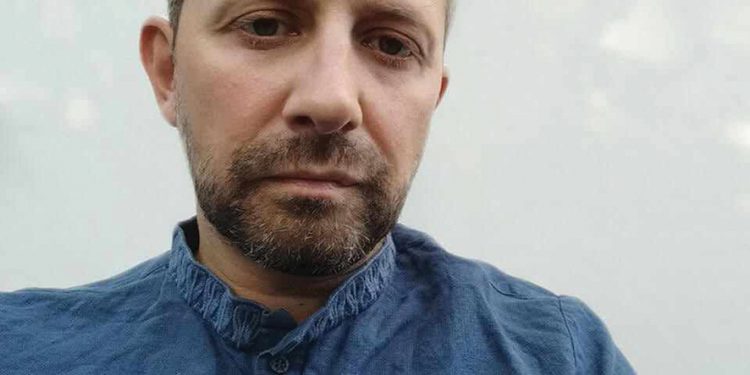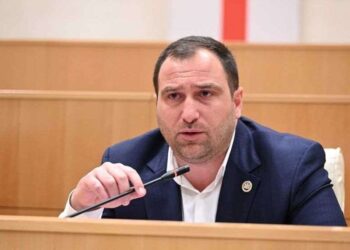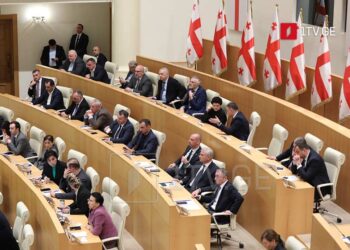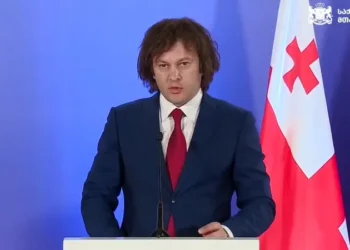Ilya Zhegulev is the author of The Tsar Move (in Russian), about the fight for power and influence in today’s Russia. Since 2002, he has worked as a reporter and then as a columnist in the Russian independent media. From 2006, he worked for SmartMoney magazine, then for Forbes, Meduza, and Reuters. He now lives in Tbilisi. Radio Free Europe’s Georgian Service sat down with him to discuss Putin’s decree to cancel visas for Georgians and resume country-to-country flights, and what this means for Georgia’s future.
You can’t call it a victory if you kidnap someone, starve them, and then make them say they’ll be friends with you in exchange for food
“I have a somewhat complex take on this,” he tells us. “On one hand, as a normal person with relatives in Moscow, I can see the positives. But my wife is Ukrainian and I remember her saying, ‘when the flights are resumed, there will be a flow of Z-patriots coming here and we will have to leave.’ I don’t think that, I don’t expect a gigantic wave of ‘patriots’ to start crashing into Georgia, prancing around in Tbilisi. It won’t happen.”
Can you explain the gesture? What did we do to merit such a “favor” from Putin?
It’s more like what Georgia didn’t do, to be honest. It didn’t join the sanctions against Russia, it isn’t actively denouncing the war – to be more precise, the population of Georgia denounces it, but the government has a more pragmatic stance. And the latest factor, which I think was noticed in Moscow, is how the Georgian government actively criticizes its Ukrainian counterpart. Because of Saakashvili, they seem to have become two opposite camps and are exchanging rather strong-worded messages. Which is against the trend – it’s not trendy nowadays to criticize Zelensky and the government in Kyiv.
So is the flight resumption a reward for us “behaving well”?
Yes, it’s an example for others to follow. If you behave well, there will be “candy”.
I wouldn’t exclude some sort of re-establishing of diplomatic relations between the two countries
What might earn Georgia more “candies”?
More trade turnover, I guess, which is already on the rise. I saw sardine cans in Tbilisi which had “Za Pobedu” (For Victory) written on them. That’s already happening. What might happen – well, I wouldn’t exclude some sort of re-establishing of diplomatic relations between the two countries. It won’t be full restoration, but something like the Japan model, where the two countries are formally still at war, not signing a peace agreement because of their territorial dispute, but they do talk to each other, they have diplomatic relations with each other.
How much of a reward can the increase in trade turnover be, when Russia can switch it off at whim, if we suddenly decide not to behave so well?
That’s obviously what Russia will do and has done many times in the past. This is leverage they have used not only on Georgia itself, but also on parts of Georgia that consider themselves independent countries – they have used trade to pressure Abkhazia, for example, when they didn’t want to follow Moscow’s directives in one matter or another.
Some in Georgia hope that normalization of relations with Russia represents a chance to get our occupied territories back. On a scale from 1 to 10, how realistic would it be to expect “positive dynamics” regarding Abkhazia and Ossetia?
0. Not more, I would say. Because there is nothing that can stop Russia from keeping these territories and handing out other “bonuses” to Georgia instead for good behavior. There is no consideration given to this scenario in Moscow at all. From their perspective, this ship has sailed. Yet the Georgian side doesn’t push this issue that hard either, and there was a rather peculiar statement from the Prime Minister, when he said ‘We won’t go into NATO without first solving the issue of the territorial integrity of Georgia. The only way to solve this is through peace.’ That’s exactly what the Kremlin wants to hear: keep things the way they are.
If there is a diplomatic victory here, to whom does it belong?
I don’t think this can be viewed as a diplomatic victory for anyone. Georgia is practically blocked, they don’t have much choice here. It’s a country held hostage by Russia. And for Russia, you can’t really call it a victory if you kidnap someone, starve them, and then make them say they’ll be friends with you in exchange for food.
Interview by Vazha Tavberidze














